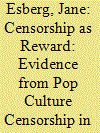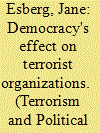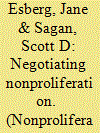|
|
|
Sort Order |
|
|
|
Items / Page
|
|
|
|
|
|
|
| Srl | Item |
| 1 |
ID:
174458


|
|
|
|
|
| Summary/Abstract |
Censorship has traditionally been understood as a way for dictators to silence opposition. By contrast, this article develops and tests the theory that certain forms of censorship—in particular, prohibitions on popular culture—serve not only to limit political information but also to reward dictators’ supporters. Using text analysis of all 8,000 films reviewed for distribution during Chile’s dictatorship, I demonstrate that rather than focusing only on sensitive political topics, censors banned movies containing content considered immoral. Through a combination of qualitative and quantitative evidence, I show that these patterns cannot be explained by masked political content, distributor self-censorship, or censor preferences. Instead, they reflect the regime’s use of censorship as a reward for supporters, particularly conservative Catholic groups. My findings suggest that even repressive measures can be used in part to maintain support for authoritarian regimes.
|
|
|
|
|
|
|
|
|
|
|
|
|
|
|
|
| 2 |
ID:
138783


|
|
|
|
|
| Summary/Abstract |
How does democracy influence terrorism? The regime-responsive school argues that lack of representation in autocracies motivates violence; the regime-permissive school posits that individual liberty in democracies allows it. The schools thus disagree about the democratic feature to which violence responds—representation or individual liberty. These arguments are problematic in two ways. First, neither accounts for the potentially competing effects of different democratic features. Second, treating terrorism as a set response to operating context ignores the operational processes behind violence, described in organizational theories of terrorism. This article develops a bridge between the regime-responsive and regime-permissive schools by applying organizational theories of terrorism to their key arguments. I argue that representation and individual liberty have independent, and sometimes competing, effects on armed groups' missions, hierarchies, and membership—collectively organizational capacity, the ability to survive and influence the environment. This explains the mixed effects of democracy on terrorism: both high-functioning democracy and repressive autocracy weaken organizational capacity, but decreased representation in a democracy or higher individual liberty in an autocracy removes organizational stresses. New research on Chile between 1965 and 1995—representing five government periods, with four armed groups operating—acts as an initial test of these relationships.
|
|
|
|
|
|
|
|
|
|
|
|
|
|
|
|
| 3 |
ID:
111131


|
|
|
|
|
| Publication |
2012.
|
| Summary/Abstract |
In nuclear nonproliferation negotiations, many governments pursue multiple objectives, and changes in policy can occur rapidly-and often unexpectedly. For these reasons, understanding nonproliferation requires empathy and imagination rather than just historical fact. This article considers one teaching tool to encourage such insight-simulations-and demonstrates how teaching and scholarship can interact to improve our understanding of the complex decisions and negotiations involved in nuclear nonproliferation. The article consists of five parts: first, it explains the benefits of simulations as both a policy development tool in Washington and as a teaching tool in universities; second, it describes the pedagogical strategy of the Stanford University simulation program; third, it shows how the simulations have identified and highlighted theoretical and substantive insights that are often neglected in scholarly studies of nonproliferation; and fourth, it describes how students are tested to enhance the learning experience from the simulation. Fifth and finally, the article provides concluding observations about how using simulations in the classroom can help scholars develop insights that improve their understanding of real-world nuclear negotiation dynamics and outcomes.
|
|
|
|
|
|
|
|
|
|
|
|
|
|
|
|
|
|
|
|
|